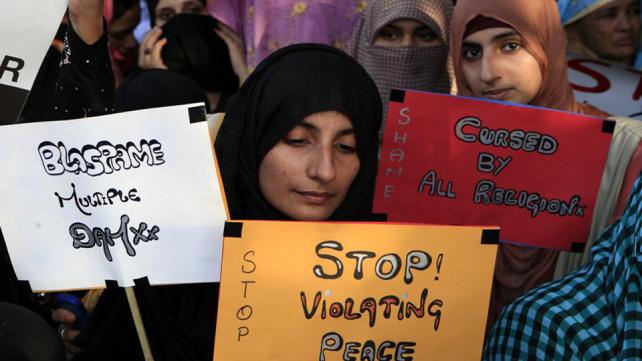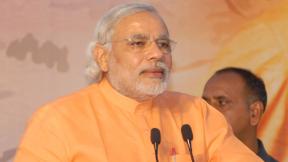
At this writing, three American embassies and one German embassy have been destroyed or damaged, and four diplomats as well as more than 10 protesters are dead. This in response to an amateur but vicious film made in the United States depicting Prophet Muhammad, peace and blessings be upon him, in the worst possible stereotypical image - one touted regularly by Islamophobes.
And once again, like with the 2005 Danish cartoon issue, the battle lines have been drawn: the West purportedly in the corner of free speech, the Muslim world in the corner of love and respect for Prophet Muhammad, peace and blessings be upon him. Rudyard Kipling famously said, “The East is east and the West is west and never shall the twain meet.” The way many in the West are seeing this situation is blind to Muslim reality and the way many Muslims are seeing this is blind to Western reality.
Extremists on both sides feed off of other. Those who use hate speech to incite hatred seek the kind of response that we have seen over the last week. And extremists on the Muslim side are only happy to oblige. But neither represents the majority of Muslims or the majority of non-Muslims.
We can try to understand why each side sees the issue as it does. We don’t have to accept the argument, but we can at least try to understand. That is the first step in ensuring that silent majorities can eventually corner minority extremists on both the sides.
Muslims love the Prophet, often more than themselves
For Muslims, Prophet Muhammad, peace and blessings be upon him, is not a distant historical figure. He is the very embodiment of how to live the life of a successful human being, spiritually and otherwise. He is a leader, teacher, and role model revered for his piety, good character, honesty, and other noble characteristics.
The Prophet’s words and actions guide how Muslims pray, eat, meet, greet, and more, and this is not perceived of as an intrusion on personal choice. Rather, it is seen as voluntarily following someone described as a mercy to all of humankind, someone who expressed deep love for humanity.
Muslims love him, often more than themselves, for the gift of helping us live our faith in the best way, and leading us to a path that leads to Heaven in the afterlife. In the five daily prayers, Muslims ask God to bless the Prophet and his family. When his name is uttered, it is not without saying, “(God’s) peace and blessings be upon him”. It is a love that is almost universal among Muslims, regardless of their level of faith practice. The mobs who committed violence in the name of defending him are most likely born Muslims who, although they profess deep love for him, would be hard pressed to be able to recite a verse of the Quran or a Hadith which justifies their violence.
We ardently defend those whom we love deeply – sometimes even in the wrong way, as these individual Muslims have done. A person may tolerate an offense directed at them. But do the same to their parent, spouse, or child and the reaction changes considerably.
Muslims feel deep pain when the Prophet is abused because it is not an attack on a remote figure for us, but someone who we love intensely.
This is why defending his name and honor is also taken very seriously. Reactions are no doubt angry, but most Muslims lodge their protests peacefully and lawfully. As happened with the Danish cartoon issue, for a couple of years Muslims used diplomatic channels and met with members of the media to express their disapproval. It was only after a minority of hooligans got wind of what was going on that they began to give the media what they wanted: the caricature of angry Muslims bent on wanton destruction. This of course is when it became front page news.
It is not just about the film
It is not just a “little film,” which people seem to be responding to. This movie is seen as just another episode in a series of perpetual attacks by non-Muslims on Islam. Non-Muslims insulting the Prophet is nothing new to the Muslim world. It has been the modus operandi of European invaders of centuries past. They brought their missionaries along with them when they came to Muslim lands, who often slandered Prophet Muhammad, peace and blessings be upon him, using the same vulgar accusations leveled against him that are found in this latest film.
This often came as a surprise, since Muslims held and continue to hold Christian religious figures in high esteem. Many of the Christian prophets, particularly Adam, Moses, John, and Jesus are revered in Islam as well. There is no question of them being depicted in despicable ways. This is despite the fact that Muslims consider the Christian belief in Jesus as the son of God an affront to Islam’s firm teaching of the absolute Oneness of God.
These “little offenses” are also taken as a part of the psychological warfare accompanied by the formal drones and wars in Afghanistan, Pakistan and Iraq. But while the context has changed, the intent to demonize the natives has not.
War is a reality for millions of Muslims worldwide, whether that is villagers killed or attacked during weddings and funerals by drone attacks in Pakistan, 15 million refugees from Iraq, Afghanistan, and Pakistan, or populations suffering from Post-Traumatic Stress Disorder in these countries. We often excuse the excesses of American soldiers who kill innocent civilians in these countries in the name of PTSD. However, we don’t consider how it affects children, women, men and their families living in these war zones. They, too, act “crazy”, as some of our soldiers have. And they, too, are experiencing PTSD. Yet, in their case, we are quick to infer that their “crazy” behavior is due to their “inferior and barbaric” religion and culture.
For Muslims, this issue is about much more than a “little film”. It is many “films” over four centuries of repeated hate, demonization, and wars.
Western emphasis on free speech
For Westerners, free speech is paramount in this issue. It is far worse to ban this film, the argument goes, than to censor its offensive content. Freedom of speech and expression are cornerstones of democracy, and while it is not the civilized thing to do to offend another’s beliefs, every person certainly has the right to do so. Committing violence, even after odious material has been published, is barbaric and savage.
This argument reflects the often delicate balance of rights and responsibilities in the American Constitution, as well as similar documents in European countries. The difficult question is: How far is too far, and when, if ever, are limitations acceptable?
It is a prickly question, but it is hardly new. Nor have Western countries been so rigid about free speech that a stand has not been taken against material deemed too offensive to publish.
For example, Austria, Germany, and Hungary, all Western countries, consider Holocaust denial or questioning the number of its victims illegal. It is forbidden to speak or write about this topic, even as these nations are democracies that uphold free speech. Holocaust denial is not a person but a historical discussion about a major tragedy. Yet these countries have decided that this form of speech is offensive enough that it must be censored. Given the role these countries played in the Holocaust, and the way the media in these nations supported this atrocity at the time, this is a reasonable move.
In America, where free speech laws are more open than those of European countries, it is not the government which lays down restrictions. It is corporate interests and collective cultural sensibilities that do.
For example, while Americans generally expressed support for the right to publish the offensive cartoons that ignited the Danish cartoon controversy in the fall of 2005, there was minimal such support for Don Imus. This white, right-wing talk show host , in 2007, called the players of Rutgers’ University’s predominantly African-American basketball team, “nappy-headed ho’s” on his show. He was subsequently fired from CBS for this comment following pressure from listeners, and more importantly, advertisers who funded his program and the station that broadcast it. It may have been fine to broadcast a comment like that in 1947 in the U.S. But it certainly was not in 2007, when prejudice and racism against African-Americans was no longer culturally, and even economically acceptable.
Perhaps more Americans, in particular, and Westerners in general, can benefit from reading Afro-centric literature about slavery, as well as the perspectives of Native Americans to understand what Muslims feel when their Prophet is demonized. These two groups have experienced the wholesale denigration of their culture and way of life in the interest of European/White slavery and genocide. Their views can help understand the pain felt when one’s values, beliefs, and history are vilified.
We no longer consider it acceptable to vilify African-Americans or the Holocaust. Yet, we somehow feel it is an affront to free speech if we object to those who tout Islamophobia in the service of demonizing one-fifth of humanity.
Coming to a fair understanding
Muslims have, and continue to, condemn the violence committed in response to the film, particularly the murders of Libyan ambassador Christopher Stevens and three other Americans, as well as the attacks on embassies. At this writing, Saudi Arabia's Grand Mufti had denounced attacks on diplomats and embassies as un-Islamic, and other Muslim scholars and leaders around the world have done the same.
Now, it is crucial that those guilty of murder and vandalism be punished after a proper trial. As well, some form of compensation should be offered to the attacked embassies and their personnel who were harmed. This is a requirement of Islamic law, and the best course of action if we are to move forward. It will also make it clear to those responding to future insults against our Prophet in a way contrary to his teachings that such violence will not be tolerated.
On the Western side, an honest discussion about hate speech and Islamophobia needs to begin. We must recognize that while being able to express oneself freely is crucial in a democracy, we already have restrictions on this right. As well, we cannot allow those who seek to intentionally incite dupe us into believing that restricting speech that insults and offends is an affront to free speech. But perhaps, in the American context in particular, we must also create a climate where insulting and offending any group of people, be they African-Americans, Jews, or anyone else cannot be tolerated in a land that values free speech, but also, freedom of religion and respect for other faiths.
Hate speech harms, and it kills. It is the match waiting to be lighted by extremists on either side. The question is, what will the silent majority on both the Western and Muslim sides do now to ensure that nothing like the violence we have seen in the last week is ever repeated again?








Add new comment